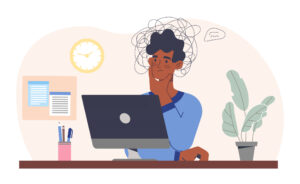Destigmatizing mental health conversations in the workplace: What you need to know now
A Ragan webinar next week tackles offers practical models for engaging with workers on the difficult challenges around mental health conversations.

Employees consistently cite mental health as a top concern these last 15 difficult months, even while things are looking up—the pandemic is receding and workers are returning to the workplace—mental health remains a concern in workplaces everywhere.
Issues around work-related stress and burnout, substance abuse and anxiety have always been there, and workplaces need to address these issues if they want their people performing at peak capacity.
But it’s a very difficult subject for employees in a workplace context. Research indicates a mere 17% of employees are having conversations with managers about mental health and well-being, and only a third of employees feel their employer has taken steps to support their mental health.
Clearly, employers need to do a better job at mitigating workplace stress, burnout, loneliness, depression and other health issues.
In this context, then, Workplace Wellness Insider is offering a must-attend webinar on this topic this coming Tuesday, June 15.
Presenters include Dr. Karla Lever, Director of Employee Assistance Program at Atrium Health, and Aparna Balasundaram a global leader in mental health, well-being and resiliency. They’ll begin with a primer in understanding mental health issues in the workplace and how to recognize the signs of those who are struggling.
We continue with wellness champions from Breakfast Culture, Cozen O’Connor, ADP and Arbitration Forums, who will be sharing strategies and tactics to best partner with communicators and management teams to alleviate the strain on employees to reduce presenteeism and absenteeism, and create a better place to work for your employees, whether they’re remote or in the office.
Specifically, this employee wellness webinar will explore strategies that wellness leaders and their communications colleagues can use support workers with mental health problems and to create accessible and productive environments, both in the office and remotely.
Here are some of the takeaways.
- Learn to recognize signs of employees’ poor mental health.
- Understand the role of the workplace for shaping mental health and wellbeing among employees.
- Help to reduce the stigma of mental health in the workplace.
- Craft ways to create environments of acceptance and inclusivity.
- Model out methods to allow employees a safe place to talk and seek help.
- Build out a plan to connect line managers and the C-Suite to speak to employees about mental wellbeing
- Develop ways to HR/Wellness can partner with Communications to share consistent and safe messaging
- Learn how to measure the impact of your response on your employee’s productivity.
To learn more and to register, click here.






